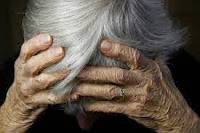Dementia, including Alzheimer's disease that affects memory, thinking, behavior and emotion, is one of the challenges of the largest global public health issues.
In about 1950, estimated 2.5 million people worldwide suffer from this disease, and reached six billion people in 2000. World Health Organization, WHO, estimates that more than one billion people aged older than 60 years or 10 percent of the world's population suffer from Alzheimer's Disease in 2003.
If your family members show the following symptoms, immediately consult a doctor.
1. Impaired memory.
Often forgotten the events that had just happened, forget appointments, asking and telling the same thing over and over again, forgetting the parking lot (in the high frequency).
2. It is difficult to focus.
Difficult to perform activities of daily work, forgot how to cook, operate the telephone, cell phone, can not do simple calculations, work with a longer time than usual.
3. Difficult familiar activities.
It is often difficult to plan or complete everyday tasks, confused how to drive, difficult to manage finances.
4. Disorientation
Confused about the time (day / date / day is important), confused on where they are and how they got there, do not know the way back home.
5. Difficulty understanding visuospatial.
It is hard to read, measure distances, determine the distance, distinguish colors, does not recognize his own face in the mirror, the mirror crashed while running, pour the water in the glass, but spill and improper pour.
6. Communication Disorders.
Difficulty speaking and looking for the right word, often stopping in the middle of a conversation and confused to continue.
7. Put the items are not in place
Forget where to put something, even sometimes suspect that steal or hide the goods.
8. False make decisions
Dressed in mismatched, for example wearing a red shirt left foot, right foot blue shirt, can not take into account the payment in the transaction and can not care for themselves well.
9. Withdraw from association
Do not have the spirit or the initiative to do activities or hobbies that used to enjoy, not too excited to hang out with his friends.
10. Changes in behavior and personality
Emotions changed drastically, become confused, suspicious, depressed, fearful or excessive depending on family members, easily frustrated and discouraged both at home and at work.
Dementia Nursing Assessment
Dementia Nursing Diagnosis, Outcome, Interventions and Evaluation
Dementia Treatment
In about 1950, estimated 2.5 million people worldwide suffer from this disease, and reached six billion people in 2000. World Health Organization, WHO, estimates that more than one billion people aged older than 60 years or 10 percent of the world's population suffer from Alzheimer's Disease in 2003.
If your family members show the following symptoms, immediately consult a doctor.
1. Impaired memory.
Often forgotten the events that had just happened, forget appointments, asking and telling the same thing over and over again, forgetting the parking lot (in the high frequency).
2. It is difficult to focus.
Difficult to perform activities of daily work, forgot how to cook, operate the telephone, cell phone, can not do simple calculations, work with a longer time than usual.
3. Difficult familiar activities.
It is often difficult to plan or complete everyday tasks, confused how to drive, difficult to manage finances.
4. Disorientation
Confused about the time (day / date / day is important), confused on where they are and how they got there, do not know the way back home.
5. Difficulty understanding visuospatial.
It is hard to read, measure distances, determine the distance, distinguish colors, does not recognize his own face in the mirror, the mirror crashed while running, pour the water in the glass, but spill and improper pour.
6. Communication Disorders.
Difficulty speaking and looking for the right word, often stopping in the middle of a conversation and confused to continue.
7. Put the items are not in place
Forget where to put something, even sometimes suspect that steal or hide the goods.
8. False make decisions
Dressed in mismatched, for example wearing a red shirt left foot, right foot blue shirt, can not take into account the payment in the transaction and can not care for themselves well.
9. Withdraw from association
Do not have the spirit or the initiative to do activities or hobbies that used to enjoy, not too excited to hang out with his friends.
10. Changes in behavior and personality
Emotions changed drastically, become confused, suspicious, depressed, fearful or excessive depending on family members, easily frustrated and discouraged both at home and at work.
Dementia Nursing Assessment
Dementia Nursing Diagnosis, Outcome, Interventions and Evaluation
Dementia Treatment

